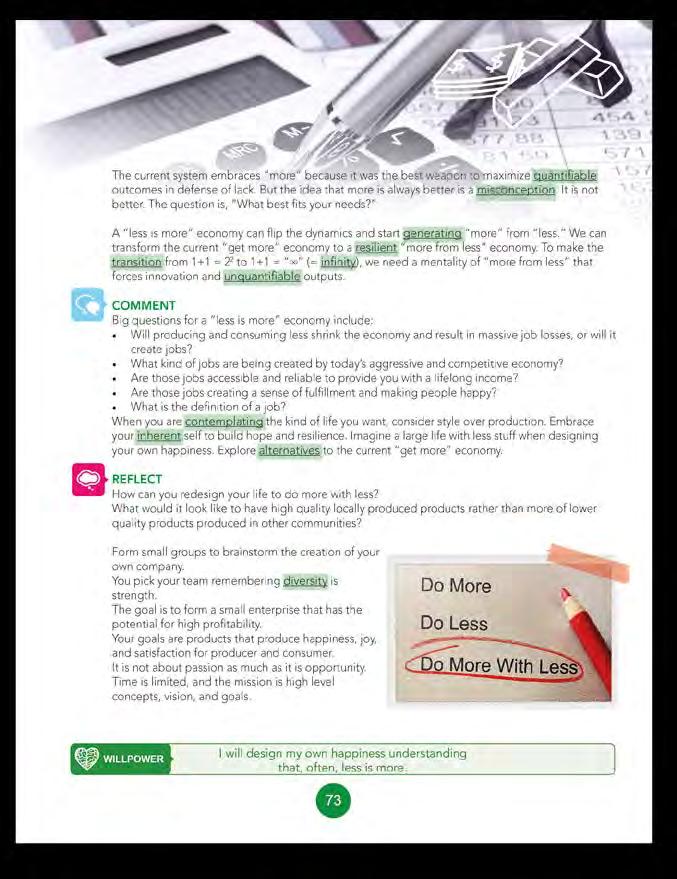





Hope is the belief that the future will be better than today and that you play a role in making it possible. It is not wishful thinking. Hope allows you to identify goals you value, set pathways to achieve them, and employ the willpower to successfully complete those goals you have chosen.
My Best Me is a series of lessons designed to stimulate students to discover their true identity and purpose. My Best Me delivers hope through implementation of a Social Emotional Learning (SEL) methodology that has shown to enhance students’ cognitive competence and give them the integrated skills they need to deal effectively with daily challenges in an ethical, effective manner. My Best Me incorporates both intra- and interpersonal conversations as well as other participatory experiences into five core competencies powered by seven principles. Your investment in elevating hope will result in greater and more enthusiastic student participation, uninterrupted classroom instruction time, and a superior learning environment.
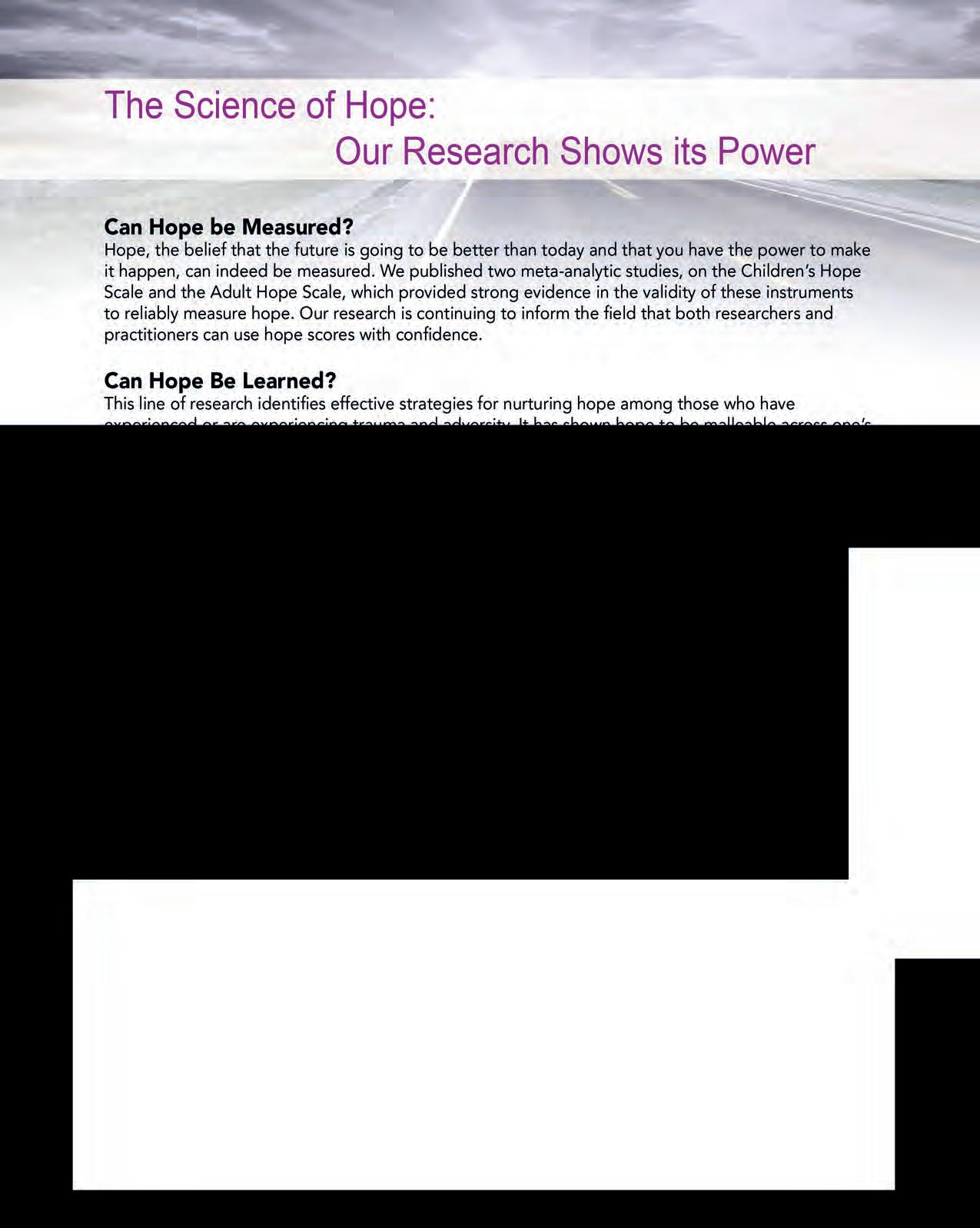
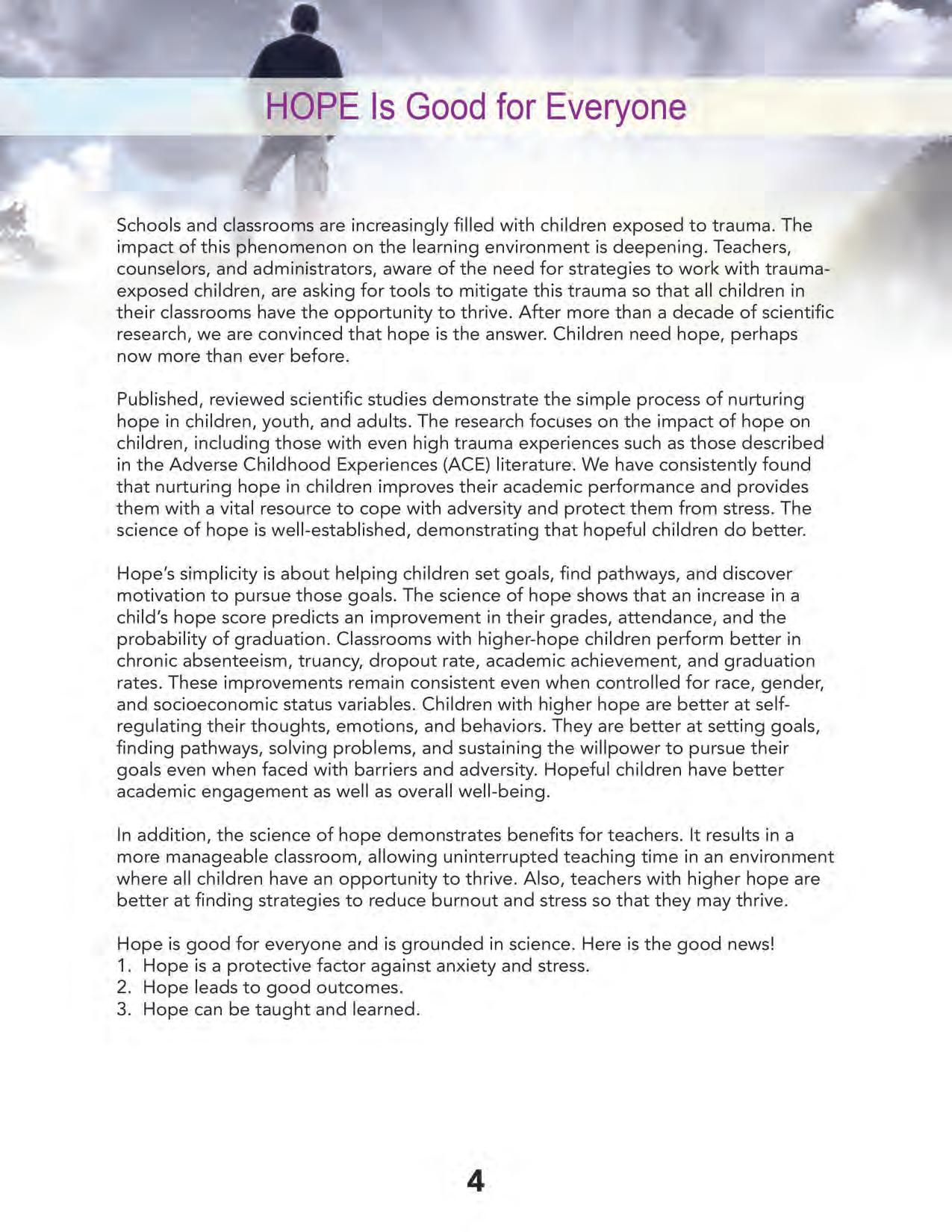

SUMMARY: Discover that hope is the confidence that tomorrow will be better than today, by setting goals, finding pathways and developing willpower
MATERIALS: Writing utensils, journal, paper, My Best Me textbook, audiovisual equipment
RESOURCES: Video - Hope - Motivational Video - 4yu.info/?i=98011
Lesson 2: Three Brains, One Mind ...............................................................................
SUMMARY: Discover how the brain cells on our gut, heart and head collect information and together create our mind and memory.
MATERIALS: Writing utensils, journal, paper, My Best Me textbook, audiovisual equipment
RESOURCES: White Paper - Understanding The Three “Brains” in Our Body (And Their Critical Role at Work)
4 minute read 4yu.info/?i=98023 Video - One Mind: Nevertheless our Three Brains in Action - time 32:154yu.info/?i=98024 Three Brains, Thinking to Doing to Being - Dr. Joe Dispenza - Time17:37 - 4yu.info/?i=98025
Cortices Technique - 4yu.info/?i=98021 - Spoiled Girl Demands a Limousine: 4yu.info/?i=98022
Lesson 3: Mindful Reflection ....................................................................................... 16
SUMMARY: Discover the calming and creative power of mindful meditation and how to apply it
MATERIALS: Writing utensils, journal, paper, My Best Me textbook, audiovisual equipment
RESOURCES: Video - Observing your thoughts - 4yu.info/?i=98031, Video - You are more than thoughts4yu.info/?i=98032
Lesson 4: Embrace Change
SUMMARY: Discover how important change is and that either pain, desire or decision brings change
MATERIALS: Writing utensils, journal, paper, My Best Me textbook, audiovisual equipment
RESOURCES: Video - Three Forces of Personal Change - 4yu.info/?i=98041, Video - Failure is Part of Success - 4yu.info/?i=98042
Lesson 5: My Inner Voice ............................................................................................. 20
SUMMARY: Discover how our soft inner voice works as our moral guardian, it looks after our interest
MATERIALS: Writing utensils, journal, paper, My Best Me textbook, audiovisual equipment
RESOURCES: Video - Beautiful Souls - 4yu.info/?i=98051
Lesson 6: A Bright Future ............................................................................................ 22
SUMMARY: Discover that fulfilling people’s needs and desires will provide for a living, not passion
MATERIALS: Writing utensils, journal, paper, My Best Me textbook, audiovisual equipment
RESOURCES: Video - Don’t Follow Your Passion - Mike Rove - 4yu.info/?i=98061
Lesson 7: The True Mirror ............................................................................................ 24
SUMMARY: Discover how being truthful to oneself empowers you in your identity and gives you the liberty to be who you are
MATERIALS: Writing utensils, journal, paper, My Best Me textbook, audiovisual equipment, 2-12 x 12 Acrylic Mirror Sheets Amazon
RESOURCES: Video - Seeing Your True Self with the True Mirror - 4yu.info/?i=98071
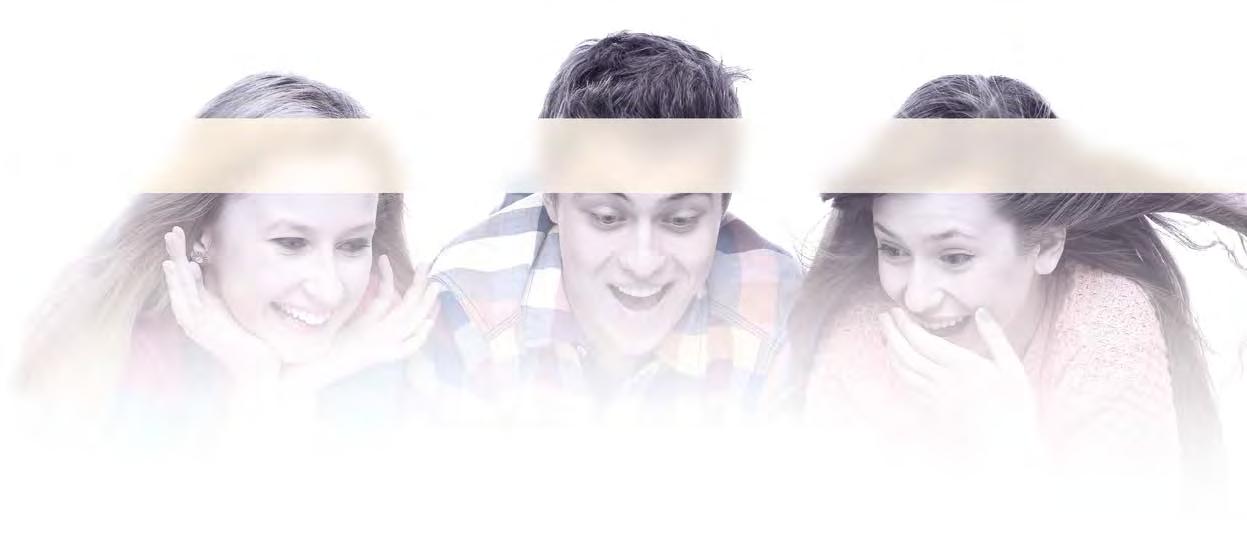

SUMMARY: Discover how a posture influences your physical as well as psychological wellbeing
MATERIALS: Writing utensils, journal, paper, My Best Me textbook, audiovisual equipment
RESOURCES: Video - Benefits of Good Posture: Top 5 Physical and Psychological Benefits - 4yu.info/?i=98081, Video - Jordan Peterson On The importance Of Good Posture - 4yu.info/?i=98082
SUMMARY: Discover that speaking truth/being truthful at all times creates a firm foundation in life
MATERIALS: Writing utensils, journal, paper, My Best Me textbook, audiovisual equipment
RESOURCES: : First, stop lying, then speak your truth - Jordan Peterson - 4yu.info/?i=98091, Video - Speak your truth or pay the price - Jordan Peterson - 4yu.info/?i=98092
Lesson 10: Feed Your Brain ............................................................................................. 30
SUMMARY: Discover how breakfast energizes you, improves your attitude and cognitive ability
MATERIALS: Writing utensils, journal, paper, My Best Me textbook, audiovisual equipment
RESOURCES: Video - Is Breakfast Actually the Most Important Meal? - 4yu.info/?i=98101, Video - How the food you eat affects your brain - Mia Nacamulli - 4yu.info/?i=98102
Lesson 11: Social Emotional Learning ............................................................................
SUMMARY: Discover that mental wellbeing i balance and manage emotional and social issues
MATERIALS: Writing utensils, journal, paper, My Best Me textbook, audiovisual equipment
RESOURCES: Video - We All Have Mental Health - 4yu.info/?i=98111

Lesson 12: Controlled Stress ..........................................................................................
SUMMARY: Discover stress is a powerful motivator, but dangerous enemy when it become toxic
MATERIALS: Writing utensils, journal, paper, My Best Me textbook, audiovisual equipment
RESOURCES: Video - Stress at School | Carley Rogers | TEDxYouth@ParkCity - 4yu.info/?i=98121
SUMMARY: Discover that the quality of life is very closely related to the quality of food choices
MATERIALS: Writing utensils, journal, paper, My Best Me textbook, audiovisual equipment
RESOURCES: Video - How the food you eat affects your gut - Shilpa Ravella - 4yu.info/?i=98131, 7 Foods
You Should Never Eat | Gut Health - 4yu.info/?i=98132 Food Guide: The Plant Paradox - 4yu.info/?i=98130 Lesson 14: Free Is the Way for Me
SUMMARY: Discover that living life free of pressure and substances increases wellbeing and longevity

MATERIALS: Writing utensils, journal, paper, My Best Me textbook, audiovisual equipment
32
34
RESOURCES: Video - Alcoholic Teen Acts Like A ‘Princess/Strictest Parents - 4yu.info/?i=98141, 2018 Drug Awareness High School Student Video Winner - 4yu.info/?i=98142, This is Your Brain on Drugs - 4yu.info/?i=98143 Lesson 15: The Locus Rule
SUMMARY: Discover if you make things happen (internal) or if things happen to you (external)
MATERIALS: Writing utensils, journal, paper, My Best Me textbook, audiovisual equipment
RESOURCES: Video - How To Stay Motivated - The Locus Rule - 4yu.info/?i=98151, The Question You Need To Ask Yourself - 4yu.info/?i=98152
SUMMARY: Discover how to become a confidant of many people, through intentional listening
MATERIALS: Writing utensils, journal, paper, My Best Me textbook, audiovisual equipment
- Effective Listening Skills - 4yu.info/?i=98161

SUMMARY: Discover how to become more empathetic and turn that into compassionate actions
MATERIALS: Writing utensils, journal, paper, My Best Me textbook, audiovisual equipment
RESOURCES: Video - Brené Brown on Empathy - 4yu.info/?i=98171, ANIMATE: The Power of Outrospection - 4yu.info/?i=98172 RSA
SUMMARY: Discover the contagious effect of acts of kindness in a world with much tragedy
MATERIALS: Writing utensils, journal, paper, My Best Me textbook, audiovisual equipment
RESOURCES: Video - Ten Incredible Acts of Kindness Caught On Camera - 4yu.info/?i=98181 Video - The Science of Kindness - 4yu.info/?i=98182
SUMMARY: Discover the clear differences with rights and privileges and the responsibilities tied to both MATERIALS: Writing utensils, journal, paper, My Best Me textbook, audiovisual equipment
RESOURCES: Video - Do we have Rights or Privileges? - 4yu.info/?i=98191
Lesson 20: Sticks and Stones ........................................................................................... 50
SUMMARY: Discover how to be the awesome this world needs by consistently applying the Golden Rule
MATERIALS: Writing utensils, journal, paper, My Best Me textbook, audiovisual equipment
RESOURCES: Video - Key & Peele - School Bully - 4yu.info/?i=98201, Video - Bullying - You Can Stop It - 4yu.info/?i=98202
Lesson 21: Critical Thinking ............................................................................................. 52
SUMMARY: Discover how to develop the skill of critical thinking by asking some simple questions
MATERIALS: Writing utensils, journal, paper, My Best Me textbook, audiovisual equipment
RESOURCES: Video - What is Critical Thinking? - 4yu.info/?i=98211
Lesson 22: Cyborgs ......................................................................................................... 54
SUMMARY: Discover why it is so important to be wise with and in control of electronic devices at all times
MATERIALS: Writing utensils, journal, paper, My Best Me textbook, audiovisual equipment
RESOURCES: Video - How social media is affecting teens - 4yu.info/?i=98221

Lesson 23: Power of Friends ...........................................................................................
SUMMARY: Discover how friends work like elevators, they can take you up or push you down
MATERIALS: Writing utensils, journal, paper, My Best Me textbook, audiovisual equipment
RESOURCES: Video - You Are The Average Of The Five People You Spend The Most Time With4yu.info/?i=98231, One Simple Skill to Overcome Peer Pressure/The Behavioral Science Guys - 4yu.info/?i=98232
SUMMARY: Discover how to look out for personal wellbeing and avoid deception even in “data”


MATERIALS: Writing utensils, journal, paper, My Best Me textbook, audiovisual equipment, access to the internet
RESOURCES: Video - 97% of Climate Scientists Really Do Agree - 4yu.info/?i=98241, The In-depth Story Behind a Climate Fraud - 4yu.info/?i=98242
SUMMARY: Discover the essential energy water provides and the impact the surroundings have on water
Writing utensils, journal, paper, My Best Me textbook, audiovisual equipment
h2o
Discover that in the tragedy the world experiences, I can still make a difference
MATERIALS: Writing utensils, journal, paper, My Best Me textbook, audiovisual equipment, access to internet
Lesson 27: Taking Care of Business
64
SUMMARY: Discover that the strategies and disciplines used to create a successful business, can be applied to a personal life with the same results
MATERIALS: Writing utensils, journal, paper, My Best Me textbook, audiovisual equipment, access to internet
RESOURCES: Video - How To Take Control Of Your Life | Relationships, School, Career & More4yu.info/?i=98271

Lesson 28: Less Is More in Designing Your Happiness

SUMMARY: Discover how greater impact, significance and joy can be obtained by decreasing things in life
66
MATERIALS: Writing utensils, journal, paper, My Best Me textbook, audiovisual equipment, access to internet RESOURCES: Video: Design Matters: Doing Better with Less - 4yu.info/?i=98281
Lesson 29: To Be a Millionaire ........................................................................................ 68
SUMMARY: Discover how attainable it is to become a millionaire
MATERIALS: Writing utensils, journal, paper, My Best Me textbook, audiovisual equipment, access to internet
RESOURCES: Video - The Millionaire Next Door - animated - 4yu.info/?i=98292, Book (pdf) - The Millionaire
Next Door: The Surprising Secrets of America’s Wealthy - 4yu.info/?i=98291
Lesson 30: Pursue Meaning, What You Sacrifice Determines Your Success
SUMMARY: Discover that greatness and meaning has to do with sacrifice
MATERIALS: Writing utensils, journal, paper, My Best Me textbook, audiovisual equipment, access to internet
RESOURCES: Video - Jordan Peterson - Do What is Meaningful, Not What is Expedient - 4yu.info/?i=98301
70
Self-assessment questions or surveys that cut to the heart of the issue
Tasks or games that involve learning through direct experience.
To obtain knowledge, understanding, and insight through interpreting a passage of text
To use or put it into action that which is understood
To watch something carefully for a specific purpose
To think, ponder, or meditate on something
Encouraging quotes, words of wisdom, or short bio blurbs of Hope Heroes
To express ideas in the written word
A visual segment to enhance understanding of a specific topic
To verbally express opinions, discuss or debate issues, explore solutions, arrive at consensus


The summing up of the subject and a statement of decision reached
To learn, write, sing, or listen to a song, enjoy a harmony of sounds

Writing utensils, journal, paper My Best Me textbook, audiovisual equipment
Resources
Student Worksheet: 4yu.info/?i=V598802
Parent Summary: 4yu.info/?i=V598852
White Paper: Understanding The Three “Brains” in Our Body (And Their Critical Role at Work) 4 minute read 4yu.info/?i=98023

Video: One Mind: Nevertheless our Three Brains in Action -time 32:15- 4yu.info/?i=98024
Three Brains, Thinking to Doing to Being - Dr. Joe Dispenza - Time17:37- 4yu.info/?i=98025
Cortices Technique: 4yu.info/?i=98021
- Spoiled Girl Demands a Limousine: 4yu. info/?i=98022
fuses, cognitive intelligence, cognition, perception, emotional intelligence, digestive intelligence, immune, serotonin, orchestrating, simultaneously, soothing, gratitude, coherence
Motivation
Insight and knowledge are expanding as science discovers more and more details about how we function. The discovery of brain cells on other organs in our body is quite revealing and therefore, it is essential that we teach our students to be more sensitive to each of these “brains” and how they operate.
Students should learn to take into consideration the signals and information these brains send out. When students learn to be more aware of their gut, pay attention to their heart and use their head, they will better understand who they are (identity), how to take care of themselves (health), how to interact with others around them (community), how to care for nature (environment) and how to engage in business with the resources they have (economics.) In short, they will be healthier, happier and better equipped for life.
To learn how thankfulness brings cohesiveness to the body’s brains. It unites and connects the three brains so they create a healthy mind, functioning well through all the challenges of life.
Read: So how can students learn to utilize all 3 brains more effectively? One basic way to integrate and synchronize all 3 brains is through the Cortices Technique, (see link) a simple self-tapping technique that anyone can learn. Another way for students to utilize all 3 brains is to be more aware of the different roles the brains play. For example, allow their heart to express its emotional intelligence and wisdom by listening to it, rather than shutting down their feelings. Taking good physical care of your digestive system
through eating healthy foods, and using strategies to heal your gut can help optimize their gut brain. With their head brain, there is increased knowledge, insight and learning to think rationally and logically so decisions are not fully based on their emotional intelligence.
Act: Using the Cortices Technique is a very fun activity. It might seem somewhat silly, but if everyone is participating it can be so much fun that you might need to calm down your students as they start the breathing exercises. These exercises will bring students a level of calm they might not be familiar with. The Cortices Technique will be enhanced if everyone’s actions are choreographed; everyone doing the same move at the same time. You can lead, asking the students to follow your lead.
View: Play the video for the class or allow the students to view it on their phones.
Comment: A review of the attached white paper and videos listed under resources will be very
helpful in leading your class through these discovery questions. The knowledge of 3 brains and one mind is provoking.

When going through these questions, you might ask your students how many clichés indicate this truth, like “gut check”, “have a heart”, and “gut instinct”. Be prepared to manage your students and their reactions. Social emotional learning is exactly what its called, and emotions at work interact with others. Try to get insight as to where your students are emotionally, especially on the days of these lessons.
Write: Students might run out of things to be thankful for. Have a long list ready to help motivate your students or have them motivate each other. 1. Health 2. Money 3. Friends 4. Freedom
5. Parents 6. Weekends 7. Relatives. 8. Pets 9. Art 10. Opportunity of Education
11. A Home 12. The Ability to Read 13. Breathing Fresh Air 14. A Bed to Sleep
15. Laughter 16. Safety and Security 17. Cars 18. Sunshine 19. Time 20. Clean Water 21. Cell Phones 22. Love 23. Books
24. Kindness of Strangers 25. Campfires
26. Pain 27. Learning from Mistakes
28. Holidays 29. Freedom of Speech
30. Rainbows 31. Tears 32. Waking up Today 33. Indoor Plumbing 34. Wisdom that Comes with Age 35. Mountains 36. Eyesight 37. Grocery Stores 38. Sunsets
39. Entertainment 40. Your Mind
Ask Myself: Allow students to contemplate, giving them some quiet time. With their devices, moments of deep thought might be few in their life.
Cheerfulness and thankfulness are invaluable. When students learn to develop these characteristics in their life, they will operate in greater harmony.
Writing utensils, journal, paper, My Best Me textbook, audiovisual equipment
Resources
Student Worksheet: 4yu.info/?i=V598812
Parent Summary: 4yu.info/?i=V598862
Video: Stress at School | Carley Rogers | TEDxYouth@ParkCity - 4yu.info/?i=98121
triggers, defuse, sensation, adrenal glands, exhausted, promptly, effectively, prioritize, stress busters, relaxation, deliberately
Teenagers, like adults, experience stress every day and can benefit from learning stress management skills. Most teens experience more stress when they perceive a situation as dangerous, difficult, or painful and they do not have the resources to cope. Some sources of stress for teens include:
• School demands and frustrations
• Negative thoughts or feelings about themselves
• Changes in their bodies
• Problems with friends and/or peers at school
• Unsafe living environment/neighborhood
• Separation or divorce of parents
• Chronic illness or severe problems in the family

• Death of a loved one
• Moving or changing schools
• Taking on too many activities or having too high expectations
• Family financial problems
These are all in addition to Adverse Childhood Experiences (ACE). Some teens become overloaded with stress. When this happens, it can lead to anxiety, withdrawal, aggression, physical illness, or poor coping skills such as drug and/or alcohol use.
Recognizing stress, what causes stress and what increases stress are aspects with which a student should become familiar. This awareness can prevent serious consequences in the student’s wellbeing.
View: Have your students watch this video and relate to it.
Read: Have students break up into smaller groups to read this section together and share their thoughts on what they read.
Below are practical suggestions for decreasing stress:
• Exercise daily and eat regularly.
• Get enough sleep and have a good sleep routine (e.g. dark, quiet, cool room, no devices).
• Avoid excess caffeine which can increase feelings of anxiety and agitation.
• Learn relaxation exercises.
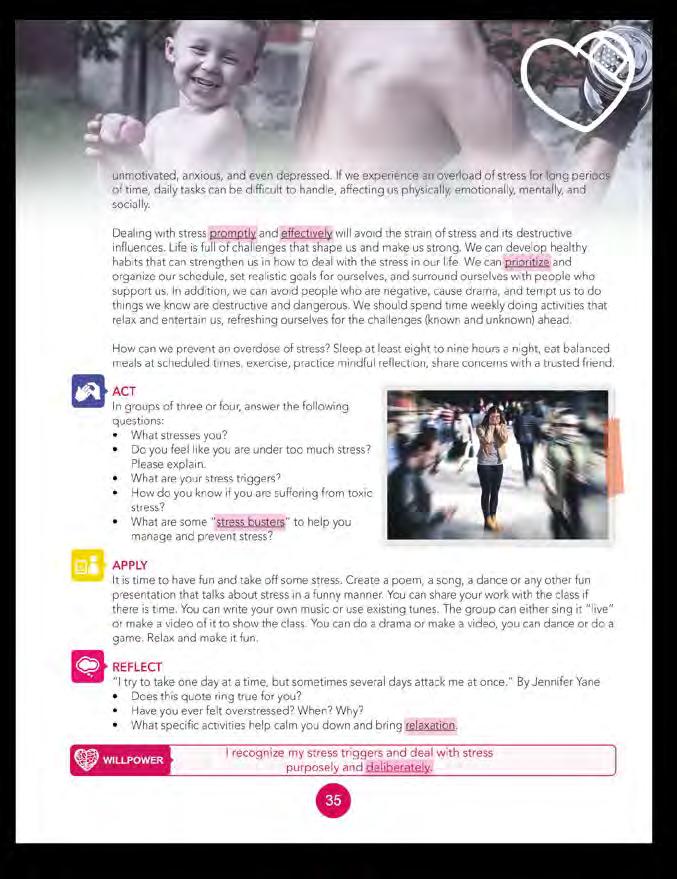
• Rehearse and practice responses to situations which cause stress. (Practice oral presentation prior to class)
• Learn practical coping skills. (Break a large task into smaller, more attainable tasks.)
• Decrease negative self-talk by challenging negative thoughts with alternative, neutral, or positive thoughts.
• Learn to be satisfied with your best performance rather than aiming at perfection.
• Take a break from stressful situations. Activities like listening to music, drawing, or spending time with a pet can reduce stress.
• Build a network of friends who help you cope in a positive way.
By using these and other techniques, teenagers can begin to manage stress. If a teen talks about or shows signs of being overly stressed, a consultation with a counselor, child and adolescent psychiatrist, or other
qualified mental health professional may be very helpful.
Act: This activity is in two parts: questions and a creative presentation. The questions are designed to relieve stress by exposing stress triggers. Explore these with your students. Invite your students to speak with you, their parents or guardians or the school counselor if any of these questions reveal a level of stress that is uncomfortable.
Apply: The skit or other creative presentation is designed to be fun and relieve stress, so make performance voluntary. Suggest making these funny or even silly. The more everyone laughs, the better experience it will be.
Reflect: Stress is stress, but being able to recognize the degrees of stress being suffered by an individual is vital to helping students. What is held as a normal stress level event, such as a classroom quiz, can be helpful to most students, motivating them to study, but can be the last straw for others, if they are already overwhelmed with other stressful events in their life. Be sensitive and observant with your students as you learn more about their personal situations. Use what you learn about them to help them understand and cope with stress.
Stretching beyond familiar limits does not always feel good, but growing and learning, the keys to school and much of life, can’t happen any other way.
The mindfulness to recognize stress is a first step to gaining mastery. Having the presence of mind to know, “I am stressing,” will allow the teen to practice responsible decision-making.
Writing utensils, journal, paper, My Best Me textbook, audiovisual equipment
Resources
Student Worksheet: 4yu.info/?i=V598816
Parent Summary: 4yu.info/?i=V598866
Video: Effective Listening Skills4yu.info/?i=98161
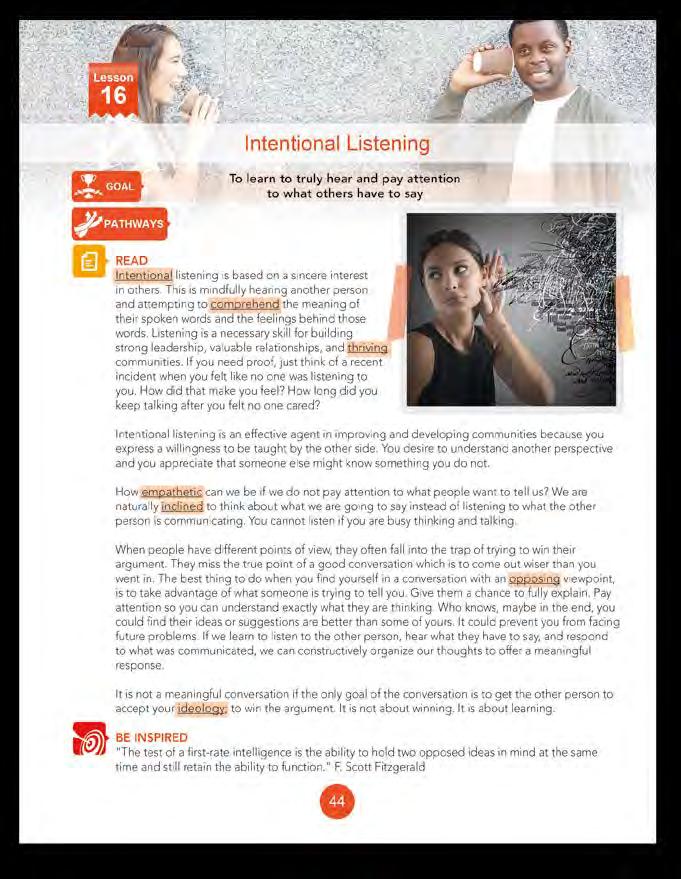
Glossary
intentional, comprehend, thriving, empathetic, inclined, opposing, ideology, effective, attentively, concise, evidence, harness, penetrating, emphasize, underscore, elaborate Motivation
As you teach your students to be better listeners, improve your listening skills at the same time. Research shows that listening to students is critical to the student/teacher relationship. Knowing their teacher is interested in what they are saying makes students feel cared for and emotionally connected, which is necessary for students’ motivation to learn.
Unless the teacher appears to be completely focused on the students speaking, and intently listening, students are apt to think the teacher doesn’t care about them. Through active listening to the students, teachers build a relationship of trust and care that is essential to students’ motivation. By setting an example and teaching active listening, teachers help students overcome poor listening habits such as:
• dwelling on internal distractions
• developing a prejudice about the speaker due to an early remark with which the listener disagrees
• focusing on the personal characteristics of the speaker or their poor delivery, which prevents understanding.
Poor listening habits interfere with classroom learning as well as interpersonal communication. Learning to listen intently will improve students’ study skills.
Intentional listening is the greatest communication skill to develop. Intelligent and meaningful dialogue can only happen when intentional listening is practiced. Through listening, strong connections are made.
Read: Our education and socialization has placed an emphasis on teaching us how to share or give our thoughts (e.g. read, write, and speak), but has done little to prepare us to receive and understand the thoughts of others. There is a huge difference between waiting politely to speak and empathic listening with the sole intent of understanding what the other is trying to communicate. Intentional listening is the only way to really hear.
Listening and hearing are two different things.
Listening is often what happens when we look at someone while they talk. Hearing and understanding what is said requires active, intentional listening. It takes practice, but it can change everything, not the least of which is improved academics and relationships.
Be Inspired: Ask students to express what this quote is saying. The art of dialogue is something students should learn to appreciate.
View: Ask the class to practice active or intentional listening while watching this video on listening.
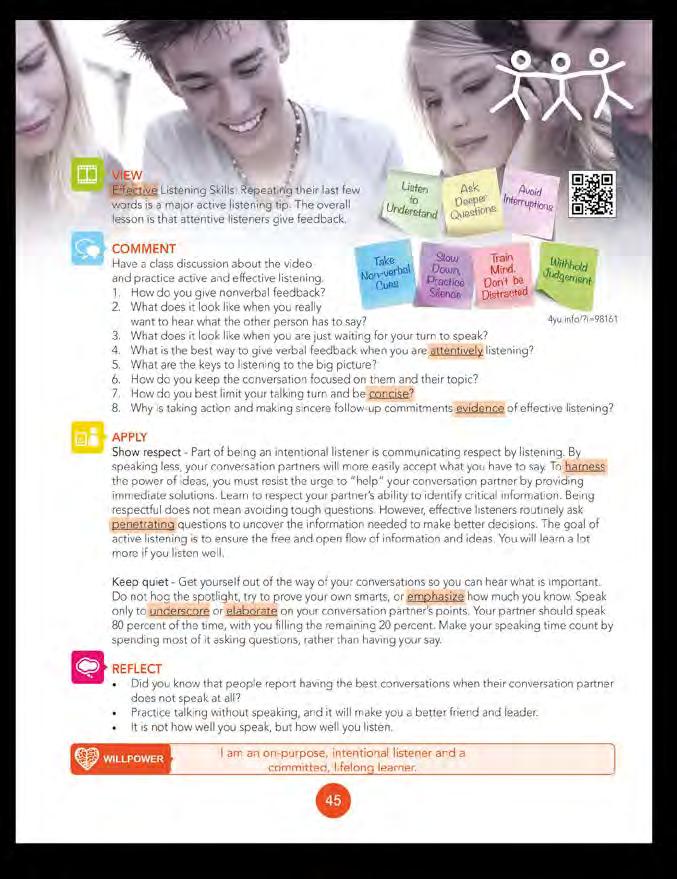
Comment: It may sound silly, but active listening can be exhilarating. You might be surprised by how much you have missed in the past when your mind has jumped ahead to what you have to say or wandered off to pick out tomorrow’s clothes. You know what we’re talking about. It happens to all of us.
Feedback is when the listener summarizes or paraphrases the speaker’s literal and implied message. Although some people recommend giving feedback
with a statement rather than a question, the objective remains the same; to clarify either the factual and/or emotional content of the message. Through refining the listener’s interpretation of the speaker’s statements, the speaker gains greater insight into their own feelings and can clarify their message. The speaker also knows the listener is really paying attention. At the same time, the listener improves their ability to focus on a speaker and to think about implied meanings.
Apply: Although the feedback step is at the heart of active listening, the following steps are necessary for success:
1. Look at the person, and suspend other things you are doing. Eliminate distractions; do not read texts or answer calls.
2. Listen in order to understand the impact and emotion of the content.
3. Be sincerely interested in what the other person is talking about.
4. Restate what the person said.
5. Ask clarifying questions.
6. Be aware of your own feelings and existing opinions.
7. Never interrupt.
Reflect: Students should understand how influential they can become with intentional listening. People love talking to others who know how to listen. It gives them respect and increases their self-esteem. Active listening is another tool for students to utilize as they tread the pathway to their goals.
We can never know everything, so it is essential to learn the best way to listen. A person who’s listening is receiving knowledge, and knowledge is power.
Writing utensils, journal, paper, My Best Me textbook, audiovisual equipment, access to internet
Resources

Student Worksheet: 4yu.info/?i=V598826
Parent Summary: 4yu.info/?i=V598876
recurring, degradation, annihilation, villain, reconcile, divert, insulate, numb, unrighteous, eliminating, clueless, devastating, alleviate, extent
As primary stakeholders in the wellbeing of children, it is easy for educators to try to avoid global tragedy. But when students try to make sense of devastating world events, educators are often the first responders. Teachers have the opportunity to help students understand that which is shocking and disturbing in a holistic way. Here are some things to think about:
1. The most important thing is to recognize the events that happened. 9th graders respond well to authenticity.
2. One of the best ways teachers can support students is to get the conversation started. Ask about what students already know and what they’re curious about; then find a way for the dialogue to match your classroom climate.
3. It is important to remember that adolescent students will exhibit a wide array of reactions, ranging from apathy and indifference to grief. As an educator, you’ll have to tolerate the variability of their responses. Share with your students that talking about global tragedy is as difficult as it is important.
4. Do not avoid the conversation. It is tempting to avoid talking about tough topics with our students, but moments like these are reminders that educators play an extraordinary role; beyond instruction about the facts, teachers can help students notice, understand and tolerate their own emotional landscape.
Listening to the news around the world makes us informed on what is happening, making us more intelligent, helping us develop an opinion on certain issues and creating opportunities to finding solutions.
Ask Myself: Current events help teens better understand the world around them. Teens may not appreciate the need to learn and understand current events, but when they see what is going on in the world, it can change their entire perspective on life and thus the purpose of this lesson.
Read: A major challenge for any teacher is knowing how to present news to students about tragic events at school, their community or in the world. Many students are exposed to these news stories
along with the rest of us, and they will likely have fears, concerns and questions about the event and what it means. Tragedy can come knocking on our doors, therefore, it is good to be open and vulnerable when these topics present themselves.
When guiding your students through a crisis, following the policies of your school or district is foremost. It is crucial during a sensitive time that you establish yourself as an authoritative support figure without overstepping your bounds. Many school districts do have policies in place, so familiarize yourself and your students with them; and if your school or district does not, encourage your principal to begin a discussion.
Write: You can be prepared for this section by having some images of recent tragedies to show students. It will give them a chance to process what they see. Responses to these questions will vary from student to student depending on their level of empathy or nearness to some tragic event. Students

can answer, “I don’t know.” This is not a current events pop quiz. It is a reality check for your students. Are they aware of the world around them? How are they equipped to deal with it and talk about it?
Comment: Allow the students to mingle around the class asking their classmates, “What do you care about?” Allow them to group around like interests. Apply: As you call out each of the topics in the textbook ask a student to help you keep toll. Whatever topic wins, the goal is to find a single person (as a class) suffering from the mentioned tragedy to help. What could your class do?
Reflect: Can you make a difference? Could an empathic friend in your life make a difference if you needed help? Keeping up with the local, state, national and international news makes you more intelligent and helps you form opinions on certain issues. Keeping up with the news is not a new habit. In primitive times, tribesmen pumped returning scouts for their observations on the happenings in nature and the neighboring village. That information aided their survival and is likely why we developed such a pull towards the news throughout the centuries.
Before the services of Facebook, Huffpo, or Reddit, informed citizens eagerly consumed newspapers, which came out in multiple editions each day to meet the demands for the latest news.
Students should educate themselves on world issues, because humanity is intertwined and when we see others suffering, we hurt. Students should learn to be compassionately aware of the news and events and be involved as much as is healthy at this stage in their life.
Writing utensils, journal, paper, My Best Me textbook, audiovisual equipment, access to internet
Resources
Student Worksheet: 4yu.info/?i=V598828
Parent Summary: 4yu.info/?i=V598878
Video: Design Matters: Doing Better with Less - 4yu.info/?i=98281

decreasing, increase, volatile, alleviate, scarcity, deficiencies, ensure, acute, instinct, exponentially, draining, quantifiable, misconception, generating, resilient, transition, infinity, unquantifiable, contemplating, inherent, alternatives, diversity
This lesson is intellectually exhilarating because it challenges the process and the products to infinity. Even simple things like strawberries for example. Is there a reasonable correlation between the size/ weight and the level of your satisfaction with strawberries? Are larger strawberries yummier than smaller strawberries? Or more nutritious? And are “more” strawberries better and do they make us happier than “less” strawberries.
Many of us compare size or volume relative to price when buying strawberries. We almost automatically associate increased size/volume with increased satisfaction, but it turns out that this is not necessarily the case. When you cut large strawberries, you may find that the meat is mostly white and rather firm. They don’t have much aroma/flavor and taste bland. When you cut smaller in size and lesser in weight organic and heirloom strawberries grown by a local farmers they are beautifully red inside and out. The flesh is dense but tender, they have a fragrant aroma and delicious juice. Both flavors and nutrients are “maximized.”
In today’s efficiency-first economy, “more” in apparent quantity is often diluted while “less” can be condensed and rich. Less is more!
The dichotomy between “more” and “less” is a sharp division of things and ideas into two contradictory parts. Technological revolution is doing more with less. It is called advancement.
View: The creators of the video have an excellent point about designing for efficiency. After several redesigns throughout history, modern bridges can span many times the gap of ancient ones with dramatically less material. The producer takes the logic of less is more to infinity which is thought provoking.
Comment: What does “less is more” mean personally? How can less high quality actually relate to more? How does fear and scarcity drive consumerism?
Read: More from Less is an important,
unexpected, and heartening change in our relationship with the planet. Throughout the Industrial Era, increases in human population and prosperity came at the expense of the earth. Now we are able to improve the human condition while also treading more lightly on the planet by consuming fewer resources, using less cropland, reducing pollution, bringing back species we had pushed to the brink of extinction, and so on.
More from Less is a provocative and counterintuitive argument that two of the most important forces responsible for this change are capitalism and technological progress. In the past, this combination caused us to take more and more from the planet. Now, it is letting us get more from less. So what changed? The computer and a host of other digital tools. Quite literally, these inventions have changed the world. They’ve provided the opportunity to save on resources, while capitalism has provided the motive.
Comment: Evidence from the United States shows that even though population and prosperity
continued to increase, resource consumption has not. Instead, it is declining. The country now generally uses less metal, fertilizer, water, paper, timber, and energy year after year, even as output grows. This phenomenon is known as dematerialization of the economy.
Air and water pollution have also greatly decreased, and many threatened species have seen their numbers rebound. Even greenhouse gas emissions have declined substantially in recent years. The United States, in short, is now getting more from less; being post-peak in resource use and other exploitations of the environment. Similar patterns are seen in other rich countries.
Reflect: There is every reason to believe that capitalism and tech progress will cause dematerialization to deepen and broaden. In the coming decade, the U.S. will be using fewer resources than it is today, no matter how much its population and economy grow.
Innovation and creativity is allowing hopefilled people to design their lives.
